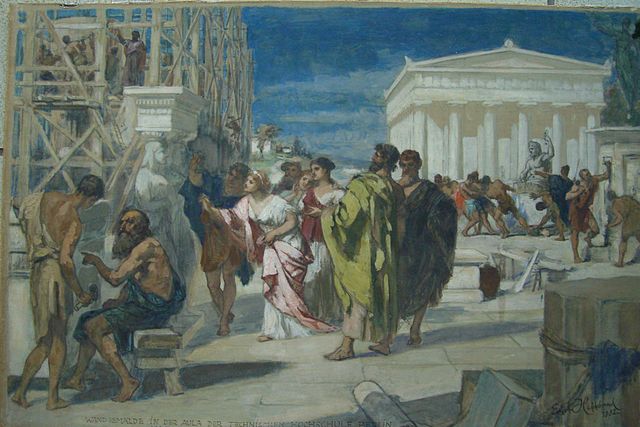What the Ancient Greeks Can Tell Us About Democracy
By Josiah Ober
Princeton/Stanford Working Papers in Classics, (2007)

Abstract: The question of what the ancient Greeks can tell us about democracy can be answered by reference to three fields that have traditionally been pursued with little reference to one another: ancient history, classical political theory, and political science. These fields have been coming into more fruitful contact over the last 20 years, as evidenced by a spate of interdisciplinary work. Historians, political theorists, and political scientists interested in classical Greek democracy are increasingly capable of leveraging results across disciplinary lines. As a result, the classical Greek experience has more to tell us about the origins and definition of democracy, and about the relationship between participatory democracy and formal institutions, rhetoric, civic identity, political values, political criticism, war, economy, culture, and religion.
Introduction: It might appear, at first glance, that there is no coherent scholarly or academic “us” who might be told something of value by studies of the ancient Greeks. The political legacy of the Greeks is very important to three major branches of scholarship — ancient history, political theory, and political science — and at least of collateral importance to a good many others (for example anthropology, communications, and literary studies). Ancient Greek history, political theory, and political science are distinctly different intellectual traditions, with distinctive forms of expression. Very few theorists or political scientists, for example, assume that their audiences have a reading knowledge of ancient Greek; few theorists or historians assume a knowledge of mathematics, statistics, or game theory; few historians or political scientists are comfortable with the vocabulary of normative and evaluative philosophy.


 Moreover, within each major field there is considerable diversity in approaches to the Greek legacy: Ancient historians are variously committed to the positivist project of “history for its own sake”, and to self-conscious model-building and theory testing. Classical political theory concerned with democracy falls into what have traditionally been clearly demarcated approaches, notably Straussian; intellectual historical; and critical/postmodern. Within political science, comparativists have focused on how institutions allow for credible commitment to law, whereas IR theorists tend to focus on the value of Thucydides’ analysis of power and conflict. So the whole enterprise of learning about democracy from the Greeks may fall victim to an all-too-familiar Academic Tower of Babel Syndrome.
Moreover, within each major field there is considerable diversity in approaches to the Greek legacy: Ancient historians are variously committed to the positivist project of “history for its own sake”, and to self-conscious model-building and theory testing. Classical political theory concerned with democracy falls into what have traditionally been clearly demarcated approaches, notably Straussian; intellectual historical; and critical/postmodern. Within political science, comparativists have focused on how institutions allow for credible commitment to law, whereas IR theorists tend to focus on the value of Thucydides’ analysis of power and conflict. So the whole enterprise of learning about democracy from the Greeks may fall victim to an all-too-familiar Academic Tower of Babel Syndrome.
Click here to read this article from Princeton University
Sponsored Content


What the Ancient Greeks Can Tell Us About Democracy
By Josiah Ober
Princeton/Stanford Working Papers in Classics, (2007)
Abstract: The question of what the ancient Greeks can tell us about democracy can be answered by reference to three fields that have traditionally been pursued with little reference to one another: ancient history, classical political theory, and political science. These fields have been coming into more fruitful contact over the last 20 years, as evidenced by a spate of interdisciplinary work. Historians, political theorists, and political scientists interested in classical Greek democracy are increasingly capable of leveraging results across disciplinary lines. As a result, the classical Greek experience has more to tell us about the origins and definition of democracy, and about the relationship between participatory democracy and formal institutions, rhetoric, civic identity, political values, political criticism, war, economy, culture, and religion.
Introduction: It might appear, at first glance, that there is no coherent scholarly or academic “us” who might be told something of value by studies of the ancient Greeks. The political legacy of the Greeks is very important to three major branches of scholarship — ancient history, political theory, and political science — and at least of collateral importance to a good many others (for example anthropology, communications, and literary studies). Ancient Greek history, political theory, and political science are distinctly different intellectual traditions, with distinctive forms of expression. Very few theorists or political scientists, for example, assume that their audiences have a reading knowledge of ancient Greek; few theorists or historians assume a knowledge of mathematics, statistics, or game theory; few historians or political scientists are comfortable with the vocabulary of normative and evaluative philosophy.
Click here to read this article from Princeton University
Sponsored Content